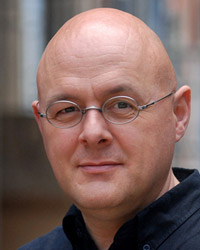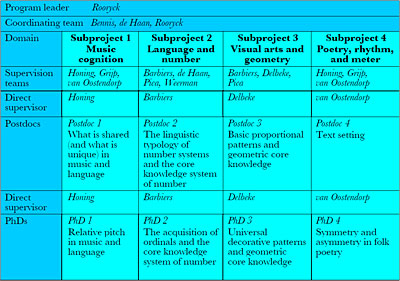Two NWO grants for Johan Rooryck
LUCL is pleased to announce that Professor Johan Rooryck has been awarded both an NWO Horizon Grant for his project entitled 'Knowledge and culture', and an NWO Vrije Competitie Grant for his project entitled 'Lend me your ears: the grammar of (un)transferable possession' for a total of €2.75m.
LUCL is pleased to announce that Professor Johan Rooryck has been awarded both an NWO Horizon Grant for his project entitled 'Knowledge and culture', and an NWO Vrije Competitie Grant for his project entitled 'Lend me your ears: the grammar of (un)transferable possession' for a total of €2.75m.
Horizon Programme
 In various domains of cognitive science – psychology, mathematics, cognitive neuroscience, linguistics, music cognition, and biology – a new paradigm is being developed that will profoundly affect research in the humanities. This emergent view holds that humans and non-human animals are born with core knowledge systems: a small set of hard-wired cognitive abilities that are task-specific, language-independent, and non-species-specific. These innate cognitive skills have the capacity for building mental representations of objects, persons, spatial relationships, numerosity, and social interaction. In addition to core knowledge systems, humans possess species-specific, uniquely human, cognitive abilities such as language and music. Spelke (2003) has suggested that the language faculty allows core knowledge systems to expand their limits, laying the foundation for the development of more complex cognitive abilities through experience.
In various domains of cognitive science – psychology, mathematics, cognitive neuroscience, linguistics, music cognition, and biology – a new paradigm is being developed that will profoundly affect research in the humanities. This emergent view holds that humans and non-human animals are born with core knowledge systems: a small set of hard-wired cognitive abilities that are task-specific, language-independent, and non-species-specific. These innate cognitive skills have the capacity for building mental representations of objects, persons, spatial relationships, numerosity, and social interaction. In addition to core knowledge systems, humans possess species-specific, uniquely human, cognitive abilities such as language and music. Spelke (2003) has suggested that the language faculty allows core knowledge systems to expand their limits, laying the foundation for the development of more complex cognitive abilities through experience.
This view on human cognitive abilities sheds a new light on problems that were long thought to exclusively belong to the realm of the humanities. Indeed, morality, mathematics, geometry, music, navigation, reasoning, and language are traditionally viewed as cultural achievements. The study of their development and variation is seen as part of the humanities and the social sciences. Hitherto, the humanities have mainly studied these human properties as unbounded properties of culture and nurture, not as the result of the interaction between core knowledge systems and language.
The ‘core knowledge’ paradigm challenges scholars in the humanities to ask the question which parts of culture belong to nature, and how nurture and culture build on nature. In this research programme, four domains of the humanities will be investigated from the point of view of core knowledge: music cognition; language and the core knowledge of number; visual arts and geometry; and poetry, rhythm, and meter.
In the overview below, the four different subprojects are listed.

In preparing this project, Johan Rooryck collaborated with researchers from the Meertens Instituut, the CNRS, and the universities of Amsterdam, Utrecht and Leiden who are active in the domains of music cognition, social sciences, linguistics, and the visual arts. More specifically, the co-applicants are Hans Bennis (Meertens/UvA), Edward de Haan (UvA), Sjef Barbiers (Meertens/UU), Henkjan Honing (UvA), Fred Weerman (UvA), Marc van Oostendorp (Meertens/UL), PierrePica (CNRS), Louis Grijp (Meertens/UU), and Maarten Delbeke (UL). From 29 May tot 1 June 2012, a highly successful Lorentz Center Workshop was organized on this topic.
The project is financed in the context of the Horizon-programme of NWO, which is focused on methodological innovation in the humanities.
Vrije Competitie
Possession is a fundamental concept of human culture. All cultures have a concept of ownership. The boundary between what is yours and what is mine may differ from culture to culture, and from individual to individual. Nevertheless, some things can only be yours or mine, for instance body parts or family members. Human language reflects this basic distinction between things that are intrinsically yours and things that are not. Most human languages make a grammatical distinction between transferable entities such as your car, my watch, or Mary’s money and untransferable entities such as body parts (my hand, your leg, her finger) and kinship relations (my sister, John’s grandfather). The occurrence of this basic distinction in many genetically unrelated languages suggests that it is an inherent part of the human language faculty.
The main aim of this project is to investigate the various ways in which language categorizes possession, how these are morphosyntactically encoded across and within languages, and how this distinction should be represented in a model of the language faculty. We operationalize this research programme in the following 3 projects:
- Project 1 (PhD1): Mapping possession onto morphosyntax in the languages of the world. An inquiry into crosslinguistic variation: how do the various semantic types of possession map onto morphosyntactic constructions?
- Project 2 (PhD2): Mapping morphosyntax onto possession in closely related languages. An investigation of how different morphosyntactic constructions map onto the same semantic type of possession in Dutch dialects and closely related languages.
- Project 3 (Postdoc): A theory for mapping possession in the faculty of language. A theoretical account of the relations between the morphosyntax and the semantics of possession. How do the grammatical components of morphology, syntax and semantics interact in the representation of possession?
The co-applicants on this project are two former PhD students of Johan Rooryck, VIDI-laureate Marjo van Koppen (UU) and Erik Schoorlemmer (UL).
